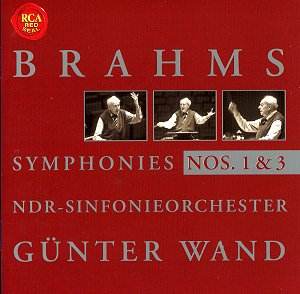This CD, together with its companion containing the other two symphonies, restores to the catalogue the Brahms cycle which Günter Wand set down for Deutsche Harmonia Mundi in the 1980s. This time the cycle is more economically spread over just two discs rather than the original three. Furthermore, a comparison with the original issue shows that the sound has acquired new lustre and presence as a result of re-mastering.
Wand was renowned as a wise and discerning interpreter of the core Austro-German symphonic repertoire. These recordings confirm that he was as fine a conductor of Brahms as he was of Schubert and Bruckner.
Recently I reviewed Wand’s ‘live’ recording of the First Symphony with the Chicago Symphony Orchestra (included in the "Essential Recordings" box). Then I commented that this NDR performance sounded more mellow but that the Chicago account had more bite. Rehearing this earlier performance now in vastly improved sound I feel it lacks nothing in ‘bite’ as compared with the Chicago performance and there is just as much urgency even though I believe the NDR account was made under studio conditions rather than ‘live’.
In both cases Wand shapes the music beautifully and his Hamburg players are no less responsive than their Chicago peers. The exquisite slow movement unfolds with glorious ripeness and is crowned by a serene account of the coda in which the solo horn and violin players distinguish themselves. The finale is mightily impressive. The great alphorn melody in the introduction rings out majestically (Track 4, 2’ 25") and when the famous ‘big tune’ arrives (4’ 31") it is presented with a natural dignity which is most affecting. Wand controls the development section superbly and brings out the dramatic qualities in the music before wrapping everything up in the triumphant coda where the seal is set on a very fine performance indeed.
Wand’s view of Number 3 is just as cogent. As is the case throughout the cycle, he is faithful to the spirit of the score as well as to the letter of it. Once again he offers an interpretation which is unmannered and wholly idiomatic, the product of a lifetime’s study and experience.
It has always seemed to me that a prime reason for Wand’s success as a conductor of Bruckner was his patience and his care for building each movement properly. These qualities also inform his Brahms. Not for Wand the fleeting, superficial point-making. He has a clear overall view of each movement and this, I believe, is why his pacing always seems so ‘right’.
Here there is just the right degree of vigour in the first movement while the Andante flows easily and with charm. (How well Wand understands that the "slow" movements in Brahms are really intermezzi.) At the start of the finale he expertly creates a mood of hushed intensity before launching into the forthright, robust material of the movement proper. Brahms did not actually mark this movement ’con brio’ but here it is delivered with a fine degree of brio. Finally, the tranquil, glowing coda is handled most impressively and without undue sentiment to complete a ripe and rewarding traversal of the symphony.
Brahms always felt undervalued in his native Hamburg, especially because he was never invited to become director of the city’s Philharmonic orchestra. How good it is to report, therefore, that the players of the Hamburg-based NDR Symphony Orchestra do Brahms proud with their alert, full-toned playing under the guiding hand of a conductor who was a master of this repertoire.
This CD, together with its companion, constitutes a very fine Brahms cycle which will give much pleasure and lasting enjoyment. I strongly recommend this release.
John Quinn


